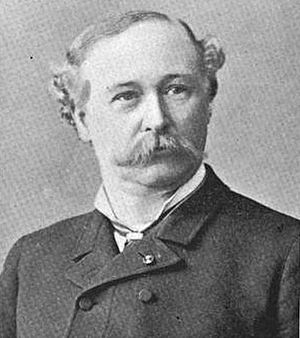George Bragg Fielder facts for kids
Quick facts for kids
George Bragg Fielder
|
|
|---|---|
 |
|
| Member of the U.S. House of Representatives from New Jersey's 7th district |
|
| In office March 4, 1893 – March 3, 1895 |
|
| Preceded by | Edward F. McDonald |
| Succeeded by | Thomas McEwan Jr. |
| Personal details | |
| Born | July 24, 1842 Jersey City, New Jersey |
| Died | August 14, 1906 (aged 64) Windham, New York |
| Political party | Democratic |
George Bragg Fielder was an important person from New Jersey. He was born on July 24, 1842, and lived until August 14, 1906. He was a brave soldier in the American Civil War. Later, he became a banker and a politician. He even served in the United States House of Representatives, which is part of the U.S. government. His son, James Fairman Fielder, also became famous as the Governor of New Jersey.
Contents
Early Life and Career
George Bragg Fielder was born in Jersey City, New Jersey, in 1842. When he was younger, he worked in banking. He also helped his father build important railroads. These included the New Jersey Southern Railroad.
Serving in the Civil War
In 1862, the American Civil War began. George Fielder joined the Union Army as a private. A private is the lowest rank for a soldier. He served throughout the entire war. During his time in the army, he showed great courage. He was promoted to the rank of lieutenant.
Political Journey
After the war, George Fielder entered politics. He was elected as the Register of Hudson County, New Jersey. This job involves keeping important public records. He served two terms in this role, from 1884 to 1893.
Representing New Jersey
George Fielder was a member of the Democratic Party. In 1892, he won an election. He became a representative for New Jersey's 7th district. This meant he served in the United States House of Representatives. He was part of the 53rd United States Congress. His term lasted from March 4, 1893, to March 3, 1895.
Later Years
After his term in Congress, George Fielder decided not to run again. He returned to his home state. In 1895, he was elected for a third term as the Register of Hudson County.
He passed away in 1906 in Windham, New York. He was buried in the Bayview – New York Bay Cemetery in Jersey City. George Fielder did not live to see his son, James, become the Governor of New Jersey. James served as governor from 1913 to 1917.
 | Kyle Baker |
 | Joseph Yoakum |
 | Laura Wheeler Waring |
 | Henry Ossawa Tanner |

